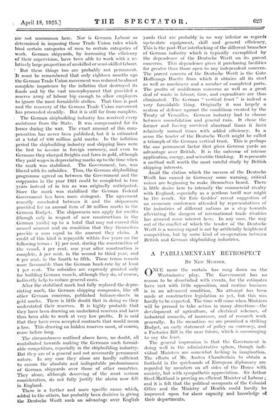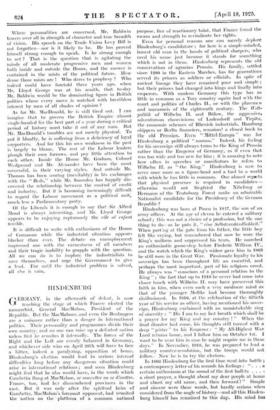A PARLIAMENTARY RETROSPECT BY NEW MEMBER.
ONCE more the curtain has rung down on the Westminster play. The Government has no reason to be dissatisfied with events, for the estimates have met with little opposition, and routine business is in an advanced condition. No attempt has been made at constructive legislation as yet, but this was hardly to be expected. The time will come when Ministers will be pressed to take action in many directions—the development of agriculture, of electrical schemes, of industrial councils, of insurance, and of research work generally. In the meantime we are promised a striking Budget, an early statement of policy on currency, and a Factories Bill in the near future, which is encouraging to say the least.
The general impression is that the Government is doing well in the administrative sphere, though individual Ministers are somewhat lacking in imagination. The efforts of Mr. Austen Chamberlain to obtain a foothold in the quicksands of European diplomacy are regarded by members on all sides of the House with anxiety, but with sympathetic appreciation. Sir Arthur Steel-Maitland is proving an efficient Minister of Labour ; and it is felt that the political occupants of the Colonial Office and the Ministry of Health could hardly be improved upon for sheer capacity and knowledge of their departments. Where personalities are concerned, Mr. Baldwin towers over all in strength of character and-true breadth of vision. His speech on the Trade Union Levy Bill is not forgotten--nor is it likely to be. He has proved himself strong enough to speak. Is he strong enough to act ? That is the question that is agitating the minds of all moderate progressive men and women both inside and outside the House, and the answer is contained in the mists of the political future. How dense those mists are ! Who dares to prophesy ? Who indeed could have foretold three years ago, when Mr. Lloyd George was at his zenith, that to-day Mr. Baldwin would be the dominating figure in British politics whose every move is watched with breathless interest by men of all shades of opinion ?
As for Mr. MacDonald, he is still tired out. I cad imagine that to govern the British Empire almost single-handed for the best part. of a year during a critical period of history must take it out of any man. But Mr. MacDonald's troubles are not merely physical. To put it bluntly, he is suffering from a deficiency of loyal supporters. And for this his own weakness in the past is largely to blame. The rest of the Labour leaders plough their own furrows, and pay little attention to each other. Inside the _ House Mr. Graham, Colonel Wedgwood and Mr. Alexander have been the most successful, in their varying styles. And outside Mr. Thomas has been scoring (inevitably) in his exchanges with the " Reds," while Mr. Snowden has happily discovered the relationship between the control of credit and industry. But it is becoming increasingly difficult to regard the Labour movement as a political unit, much less a Parliamentary party: Of the Liberals it is enough to say that Sir Alfred Mond is always interesting, and Mr. Lloyd George appears to be enjoying rapturously the role of enfant terrible.
It is difficult to write with enthusiasm of the House of Commons while the industrial situation appears blacker -than ever. The debate on unemployment impressed one with the earnestness of all members and their tragic inability to grapple with the question. All we can do is to implore the industrialists to save themselves, and urge the Government to give a lead. For until the industrial problem is solved, all else is vain.











































 Previous page
Previous page